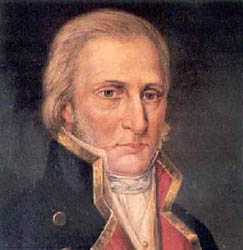Pascual Ruiz Huidobro facts for kids
Pascual Ruiz Huidobro was a Spanish soldier born in Ourense, Galicia, in 1752. He later moved to the Viceroyalty of the Río de la Plata, which was a Spanish territory in South America. He is remembered for fighting against the British invasions of the Río de la Plata while he was the Governor of Montevideo. He passed away in Mendoza, Argentina, in March 1813.
Pascual Ruiz Huidobro had a long career in the Spanish Navy. He served in places like Cádiz. In 1777, he arrived in the Río de la Plata region with Viceroy Ceballos. He held many different jobs in Spanish America. Eventually, he became a very high-ranking officer, a Navy Lieutenant General. In 1803, he was chosen to be the civil and military Governor of Montevideo. He also commanded the local navy ships there. The next year, the new Viceroy, Sobremonte, made him the chief inspector of all troops in the viceroyalty. This meant he was the second most important military leader after the viceroy himself.
British Invasions: 1806-1807
The Spanish leaders knew that the British fleet was planning to invade. The viceroy sent most of his soldiers to Montevideo. They thought the British would attack there first. But instead, the British landed near Buenos Aires. They took control of the city very easily.
Ruiz Huidobro quickly put together a group of soldiers to take Buenos Aires back. But just as they were ready to leave, Captain Liniers arrived. Liniers had important news about local people forming a resistance group. So, Liniers was given command of the troops. Using soldiers from Montevideo and the local resistance, Liniers successfully recaptured Buenos Aires. This ended the first British invasion in 1806.
The next year, the British returned for a second invasion. They landed at Maldonado and then marched towards Montevideo. Ruiz Huidobro made a big mistake. He decided to fight the British outside the city walls. He should have stayed inside the strong forts. His troops were defeated in the open fields around the city. A few days later, Montevideo fell to the British. Ruiz Huidobro was captured and sent as a prisoner to England.
Around the same time, the local government in Buenos Aires, called the Cabildo, decided to remove Viceroy Sobremonte. They wanted Ruiz Huidobro to take his place. But because he was captured, he lost his chance to become viceroy.
Returning to the Río de la Plata
Later, Britain and Spain became allies. Because of this, Ruiz Huidobro was set free. He returned to Spain. During the Spanish War of Independence, he served as a representative in Galicia's government.
When a new main government, the Supreme Junta, was formed in Seville, they learned that Sobremonte had been removed. They then named Ruiz Huidobro as the new Viceroy of the Río de la Plata. But when he arrived, he found that the local Cabildo had already chosen Liniers. Liniers refused to give up his command to Ruiz Huidobro. Since Ruiz Huidobro's appointment wasn't much more official than Liniers's, he accepted a different job. He became the Inspector of Arms for the Viceroyalty. This was his second time missing the chance to become viceroy.
During a small uprising on January 1, 1809, Ruiz Huidobro supported an idea. Bishop Lué suggested replacing Liniers with the most senior military officer. That officer was Ruiz Huidobro. Liniers even recognized him as the most senior. But Colonel Cornelio Saavedra quickly made a move that saved Liniers's position.
The May Revolution
Ruiz Huidobro supported the May Revolution. This was a big event in 1810. On May 22, during an open meeting of the Cabildo, he was the second person to speak. He spoke right after Bishop Lué. He voted to remove the viceroy from power. He also wanted the Cabildo to take political control. This would last until the King of Spain's rightful government was back in charge. (At that time, Napoleon had removed the King and put his brother Joseph Bonaparte in Madrid).
Since the Cabildo could not lead the military, Ruiz Huidobro was again suggested for the top military job. After him, Saavedra spoke. He agreed with Ruiz Huidobro's points. But he suggested a new type of government led by a Junta (a council). Saavedra's idea won the vote that day. This was the fourth, and last, time Ruiz Huidobro missed his chance to become viceroy.
During the new government, called the Primera Junta, Ruiz Huidobro was removed from his military command. This was because he was born in Spain, and they were suspicious of Spanish-born officials. In 1812, another government, the First Triumvirate, investigated him. They thought he might be involved in a plot by Martín de Álzaga. He wasn't put on trial. But he thought it would be safer to travel to Chile. He planned to offer his military skills to the leader there, José Miguel Carrera. The Second Triumvirate later named him ambassador to the government in Chile. However, he never arrived. He died on his journey in March 1813 in the city of Mendoza.
See also
 In Spanish: Pascual Ruiz Huidobro para niños
In Spanish: Pascual Ruiz Huidobro para niños
 | Bessie Coleman |
 | Spann Watson |
 | Jill E. Brown |
 | Sherman W. White |


